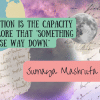Márquez told me people can fly sometimes

It is midday now. There is so much sunlight that at once everything and nothing can be seen. There is a wave, a buzz to the lights such as these. In Mymensingh, a train just left the station. A street hawker there is peeling a dull yellow banana sitting on the station floor in between two pillars. On the pillars are pastel-white posters that consecutively say, "The authority is not responsible for anything that is lost" and "For any important query, ask authority." So, the travelling hawker comes to the conclusion that being lost is not an important query. That is how he decided not to mention it to anyone.
If I don't look in the distance and instead stare at the immediate, the hawker vanishes.
Vanishes our schizophrenic sisters, memories with open-ended questions, old decaying ladies with remarkable white teeth.
But even with the moronic mindless scrolling of anxiously adamant visuals, I still can manage to look in the distance.
I've had good teachers.
One of them told me people can fly sometimes.
This Colombian journalist, whose birthday we are celebrating today, as a kid listened to his grandmother talk about domestic ghosts. He grew up and gave an entire culture their stories back. Stories where Armenian Gypsies who have been through death return because the weight of solitude was too much. Gabriel García Márquez didn't just tell stories, he gave shape to the language in which to tell them.
In that language, I want to wide open the maps of the two cities I've lived in so far and see where lie, physically, my sensibilities of Márquez. Sometimes physical proof of things becomes vital. Even before I met him, I was already living a life as claimed by Gabo's wrath of imagination. This is realism where magic doesn't pick a separate lane to exist. This is magic that hides in the maps of places one lived, on the cheeks of faces one loved.
This is a ground zero of an outbreak. The outbreak hangs upon the air and when infected, it becomes clear reality is not a linear thread. It becomes clear, sometimes the deeper the wound, the more it begs to be told in ways where the past is infinite. There is an urge to maintain the singularity we believe we hold, our uniqueness, the surety that no one else exactly knows how we feel. And then there's the pull to belong, to our chosen clan, to something bigger than us. The need to wake up from our skins, contemplating all the lives we could've lived and seeing the ones we already did. Where, like Gabo's people, we are repeating our ancestors' mistakes over and over again.
These are the books where in distant afternoons, fathers take sons to discover ice. Where the impossibility of sleep erodes memory like a gentle river polishing granites. Where in the light rain of tiny yellow flowers tiny towns get buried after patriarchs die. This is where Colonels bet their sunny chickens on races and no one writes to them. This is where Generals howl because they cannot get out of the labyrinth of solitude. Where the autumn of the patriarch menaces through the tales. Where love is smothering, gentle, crushing, anaesthetic.
These books are a masterclass on how not to look away. Gabo deliberately makes us stay half a bit ahead of the characters, giving us the free choice almost, before the horror crouching in the distance comes, to look away. It is never a shock to the system, never the suspension of disbelief encountering the ways in which life in the post-colonial Latin region can crush acres of people. History of that place was and is constantly being rewritten, so it was crucial for Gabo, however harrowing, for it to be never doubted.
By the time we reach each horror, Gabo has fed us enough steady doses of the fantastic that we cocoon out of the rigid nest of reality. So we accept what has happened point blank. We stand in front of the three hundred talking rifles and remember that the proof of our existence need not come from outside of our sovereign bodies.
I've always seen love as a response to the chaos we carry, knowing that it is both sensual and intellectual. It sits as a bridge from our need for complete solitude and singularity to the need to belong. Gabo sees it as if without it, the world will not make sense. So even in the tempest of moments, the pages of his stories may get covered with yellow butterflies sprinkled like specs of dust because lovers met. And why there wouldn't be nanoscopic yellow butterflies when lovers meet is the more important question.
The stories come that much nearer to heart because we also have seen threads of blood run through our map. Like many things, the trap of nostalgia also gets harder to avoid. We've seen forces who move the river from where it has always been.
So when Gabo invites, it makes sense to not see things in the order of man's conventional time, seeing how many of our pasts become our future.
We invent memories, we lie to ourselves, we fool ourselves. Because we have to bear the reality. We have to cope with the present, make peace with the past. Otherwise, things get dangerously close to spiralling out of control. Gabo finds the eye of that spiral, like that of a tornado. It is not diluted reality with the touch of spectacles, it is reality told in the only way possible where nothing gets lost and being lost is the most important query of all. Because "what matters in life is not what happens but what you remember and how you remember it."
We remember Gabo with the wrath of his imagination. We mention Gabo making it obvious that he is also ours. So, we claim our demented dragons and see history as a downward spiral. The races condemned to one hundred years of solitude did not have a second opportunity on earth, Gabo said. But because all the books exist now, at my arm's length, at this moment of midnight, when I'm typing this, I dare to have a second opportunity on earth. Gabo would've liked that. So, I call my schizophrenic sisters, memories with open-ended questions, old decaying ladies with remarkable white teeth. And tell bedtime stories to them that start like this,
Márquez told me people can fly sometimes.
Sumaya Mashrufa is a human being who tries to be a human being. On a more formal note, she is a translator who wants to be a good typist, transcribing the stories of people who live in her head.

 For all latest news, follow The Daily Star's Google News channel.
For all latest news, follow The Daily Star's Google News channel. 








Comments